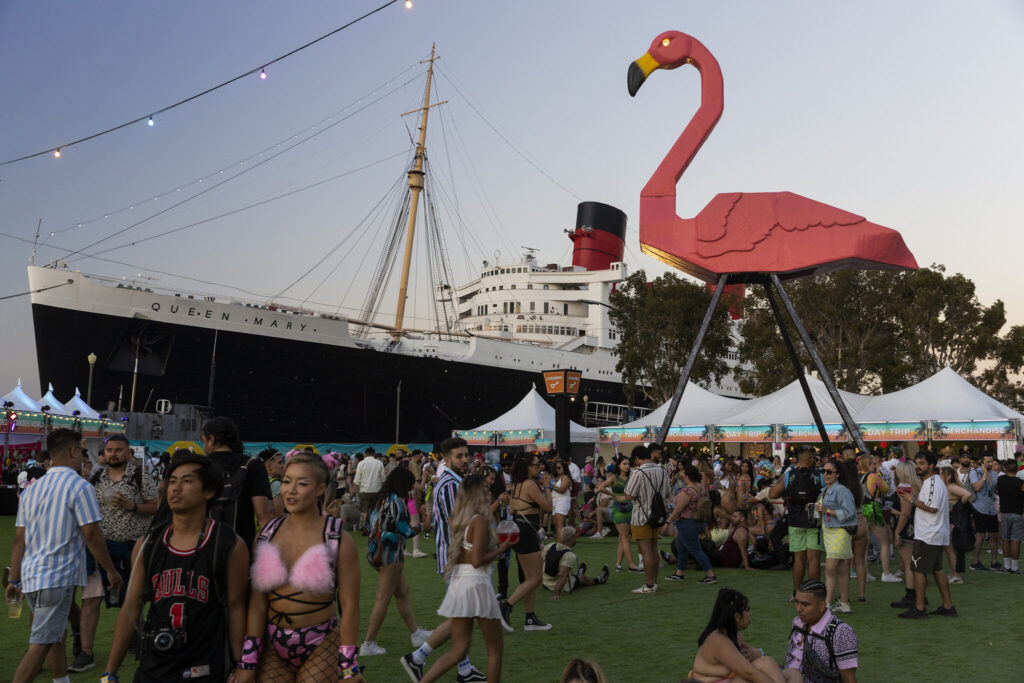A giant flamingo was erected near the Queen Mary for the Day Trip house music festival Saturday, June 25, 2022. Photo by Brandon Richardson.
More than 57% of Long Beach residents surveyed said they want cannabis sold or smoked at outdoor festivals and other special events, according to a non-scientific study conducted by the city’s Office of Cannabis Oversight.
That and other findings from an online poll of 730 residents were reviewed by the City Council this week.
City Council members for years have wanted to pass an ordinance that permits the sale and use of cannabis at music festivals and fairs, saying it would spur tourism and boost local profits in an already highly regulated legal cannabis economy.
State law has since 2018 allowed temporary permits for onsite use and sales of cannabis at certain events, but it still requires local approval. Cities like San Francisco, Oakland, Santa Rosa and Sacramento have similar permits in place.
Councilman Al Austin, who originally proposed the idea in 2019, highlighted the kinds of crowds those cities have attracted with cannabis events.
“Well, the one event that was done in Sacramento just a couple of months ago, Cal Expo, fielded over 100,000 participants over two days. … That’s nothing to sneeze at,” Austin said.
Officials released the poll in September and October, to gauge public opinion before they brought an ordinance before the council.
Of those queried, more than half wanted at least some form of event, though most skewed towards hosting events outside. Another 42.6% said they wanted no event at all.
A similar share — more than 45% — of respondents said they didn’t use any cannabis products, while 8.8% gave no answer.
In their written answers, respondents in favor of the ordinance stressed the importance of giving priority to local dispensaries. Music festivals, followed by tasting and pairing events, ranked highest as potential venues.
“I think this is an opportunity for everyone to eat,” said Senay Kenfe, local organizer and business owner. “We just have to make room for everyone to eat.”
The survey was largely positive, but among the concerns expressed by respondents were event security, secondhand smoke and people leaving events while intoxicated.
Patricia Etem, a Long Beach resident who has served on the governor’s Tobacco Education and Research Oversight Committee since 2010, warned that any ordinance would undermine critical public health protections and bring “monetary risks” not included in a city presentation she felt favored vendors over the public.
“It’s most concerning to me that the city is even entertaining, essentially, a smoking event (of) marijuana,” Etem said.
John Kendrick, co-chair of Smoke Free Long Beach, accused the city of putting “profit before health.” Standing at the podium, he lifted a bin full of discarded stash jars.
“Since this became legal, we have not been able to enforce not one policy or regulation when it comes to marijuana,” Kendrick said. “And it’s only gotten worse.”
Secondhand smoke may be unavoidable, officials acknowledged. In a study provided in the presentation — no timestamp or location was included — cannabis was found in the urine of 34% of officers who provided security at cannabis events. Some reported having red eyes, dry mouth and headaches throughout.
While she advocates for the events, Councilmember Cindy Allen expressed concern for officers and staff exposed to smoke.
“We can’t have an armed police officer exposed and then have to handle calls for service,” Allen said. “I’d be curious to see how other cities have dealt with that.”
This comes as California Gov. Gavin Newsom last week signed Assembly Bill 1775, which gives cities the option to allow dispensaries to serve hot food and nonalcoholic drinks on-site. The bill goes into effect Jan. 1.
Pushback against the bill came from the American Cancer Society and other public health groups who argue that secondhand cannabis smoke has higher particulate levels than tobacco and puts people at higher risk for cardiovascular disease, lung irritation and asthma attacks.
The bill does require employers to offer respirator masks to workers and include secondhand smoke in their injury and illness prevention plans required under California labor law.
In tandem with survey findings, officials also gave a taste of recommendations they eventually plan to present — some of which are enshrined in state law.
Six special event permits would be given to each licensed person or business a year, to include storefront and delivery operations. Retailers must be licensed and sell from a designated area at an event; sales from a wagon, cart or car are not allowed. The city will also turn away businesses that show up to events that are not registered with the state’s tracking system. Even with a permit, retailers would be subject to daily sales limits that already exist for storefronts.
Events would be obstructed from public view, not allow the simultaneous sale of alcohol and last up to four days.
In an earlier city report, officials listed the Queen Mary as an example of a potential host.
“I look forward to a big event, maybe Snoop Dogg will come here (and) we’ll have a big smoke out at the Queen Mary, who knows,” Allen joked.
H/T: lbpost.com



